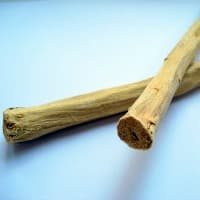The root extract of the plant Glycyrrhiza inflata (Chinese Licorice) is a source of Licochalcone A, a compound for which previous studies suggest antimicrobial and anti-inflammatory properties. German researchers assessed the effects of Licochalcone A in cell culture, isolating human skin cells and irradiating them with solar simulated light mimicking sun exposure. The team observed that skin cells pretreated with Licochalcone A produced a higher amount of ‘self-protecting’, antioxidant molecules. Consequently, significantly less harmful radicals were detected in Licochalone A treated human skin cells. In addition, the investigators also conducted a study with healthy volunteers demonstrating that the application of a lotion containing Licochalcone A-rich root extract on the inner forearms for two weeks protected the skin from damage after UV irradiation. The study authors submit that: “We conclude from these data that topical application of licorice extract is a promising approach to induce [NF-E2-related factor 2]-dependent cytoprotection in human skin.”
Licorice Compound Protects Skin from UV Effects
Jochen Kuhnl, Dennis Roggenkamp, Sandra A. Gehrke, Franz Stab, Horst Wenck, Ludger Kolbe, Gitta Neufang. “Licochalcone A activates Nrf2 in vitro and contributes to licorice extract-induced lowered cutaneous oxidative stress in vivo.” Experimental Dermatology, Volume 24, Issue 1, January 2015, Pages: 42–47.
RELATED ARTICLES




